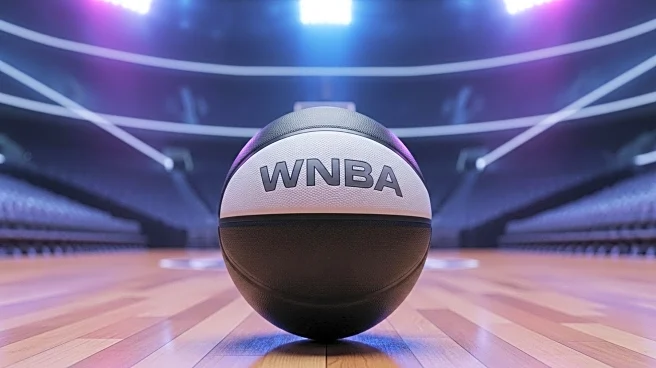What is the story about?
What's Happening?
WNBA Commissioner Cathy Engelbert has responded to criticism from Minnesota Lynx forward Napheesa Collier regarding player compensation and league leadership. Collier criticized Engelbert's handling of officiating complaints and questioned the league's leadership, particularly in terms of player compensation. Collier highlighted the significant revenue generated by players like Caitlin Clark, Angel Reese, and Paige Bueckers, who are reportedly underpaid despite their contributions to the league's financial success. Engelbert's comments on social media have sparked controversy, leading her to issue a statement reaffirming her commitment to the players and the league's future. The WNBA has recently secured a lucrative 11-year, $2.2 billion media rights deal, and teams have moved games to larger venues to accommodate increased demand.
Why It's Important?
The controversy surrounding player compensation in the WNBA highlights ongoing issues of equity and fairness in professional sports. As players like Caitlin Clark, Angel Reese, and Paige Bueckers drive significant revenue for the league, the disparity between their contributions and compensation raises questions about the valuation of female athletes. This issue is crucial for the WNBA's reputation and future growth, as it seeks to balance financial success with fair treatment of its players. The league's ability to address these concerns could impact its relationship with players and fans, potentially influencing public perception and future negotiations.
What's Next?
The WNBA may face increased pressure to address player compensation and leadership concerns as the new collective bargaining agreement approaches. Stakeholders, including players, fans, and sponsors, are likely to scrutinize the league's actions and decisions. Engelbert's future as commissioner could be uncertain, depending on how these issues are resolved. The league's response to these challenges will be critical in shaping its trajectory and maintaining its growth momentum.
Beyond the Headlines
The debate over player compensation in the WNBA reflects broader societal issues of gender equity in sports. As female athletes continue to gain visibility and drive revenue, the need for equitable compensation becomes more pressing. This situation may prompt discussions about the value of women's sports and the systemic changes required to ensure fair treatment. The WNBA's handling of these issues could set a precedent for other leagues and influence cultural perceptions of female athletes.

















